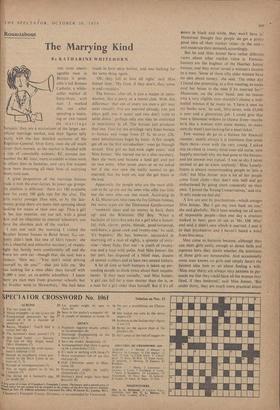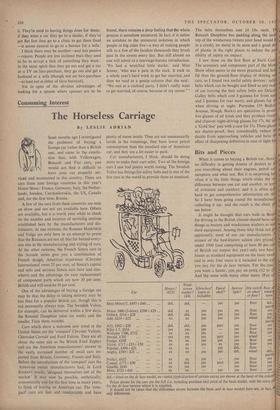Roundabout
The Marrying Kind
By KATHARINE WHITEHORN A great proportion of the marriage bureau trade is with the over-forties. In lower age groups; the position is different : there are 180 available [nen for every 100 girls ripe for the altar. The girls marry younger than men, so by the late- tv, enty group there are more men spinning about looking for mates of their own age. Thus a girl in her late twenties, not too tall, with a good skin.and no objection to manual labourers, can have the absolute pick of the market.
I met one such the morning I visited the Heather Jenner bureau in Bond Street. S:.e cer- tainly didn't look like one of life's rejects: she %'as a cheerful, and attractive secretary of twenty- eight her family were comfortably off and she drove her own car—though that, she said, was a Menace. 'Men say: "You don't mind driving yourself in, do you?"—that just kills me.' She Was looking for a man older than herself with £1,000 a year, an ex-public schoolboy. 'I know there are nice men from grammar schools, but Illy brother went to Shrewsbury.' She had been
much in love once before, and was looking for the same thing again.
'Oh, they fall in love all right,' said Miss Jenner later, 'My God, if they don't, they come in and complain.'
The bureau, after all, is just a means of intro- duction, like a party or a tennis club. With this difference : that out of every ten men a girl may meet casually. live are married already, One just plays golf. one is queer and two don't want to settle down : perhaps only one may be interested in matrimony at all. The bureau just produces that one. Fees for the privilege vary from bureau to bureau and range from LS Ss. to over £20; most introductions begin by letter. A few people get off on the lirst introduction: most go through several. 'One girl we had took eight years,' said Miss Jenner. 'She started out as a slim secretary, then she went and became a land girl and put on two stone. After seven years or so we asked her if she was sure she really wanted to get married; but she kept on, and she got there in the end.'
Apparentl■ the people who are the most diffi- cult to fix up are not the ones who offer too little but the ones who ask too much. According to A. G. Masterson, who runs the Ivy Gibson bureau, the worst types are the Distressed Gentlewoman --'snobbish ideas and no money to back them up'—and the Romantic Old Boy. 'When a bachelor of forty-five asks for a girl who is beauti- ful, rich, clever, petite, blonde, good-tempered, well-born, a good cook and twenty-one,' he said, 'it's hopeless.' He has, however, succeeded in marrying off a man of eighty, a spinster of sixty- nine—'sheer fluke, that one'—a youth of twenty- one and a man with polio. And Miss Jenner, for her part, has disposed of a blind man, dozens of unwed mothers and at least two unwed fathers.
A lot of time at both bureaux is taken up per- suading people to think twice about their require- ments. 'If they meet casually,' said Miss Jenner, 'a girl can fall for a man shorter than she is, or a man for a girl older than himself. But if it's all down in black and white, they won't have it.' Masterson thought that people do get a pretty good idea of their market value—in the end— and moderate their demands accordingly.
But he and Miss Jenner have rather different views about what market value is. Fortune- hunters are the bugbear of the Heather Jenner bureau, and they never reveal a woman's income to a man. 'Some of these silly elder women have- no idea about money,' she said. 'The other day I found one promising, at a first meeting, to make over her house to the man if he married her!' Masterson, on the other hand, sees no reason why a very eligible man shouldn't choose a well- heeled woman if he wants to. have a man on my books now,' he said,. 'fifty-seven, with £5,000 a year and a glamorous job. I could give that man a thousand widows to choose from—maybe he'd like a woman with some money, to make sure she wasn't just looking for a meal-ticket,' Few women do go to a bureau for financial reasons: nearly always it is loneliness that sends them there--even with the very young. I asked one ex-client (a twenty-three-year-old nurse, now happily married) why she had gone to the bureau; and her answer was typical. '1 was so shy I never seemed to get to know anybody.' Miss Lonely- hearts is always recommending people to 'join a club,' but Miss Jenner says a lot of her people come from clubs—they don't mix well and get embarrassed by going there constantly on their own. 'I joined the Young Conservatives,' said one. 'It only made me feel old.'
A few are sent by psychiatrists—which enrages Miss Jenner. 'But I got my own back on one,' she said gleefully. 'He'd been sending me all sorts of impossible people—then one day a creature walked in here, gave its sex as `Mr. OR Miss' and said it didn't care which it married. I sent it to that psychiatrist and 1 haven't heard a word from him since.'
Men come to bureaux because, although they can meet girls easily enough at dance halls and espresso bars, they doubt whether the intentions of those girls are honourable. And occasionally some man knows no girls and simply hasn't the faintest idea how to set about finding a wife. 'Men over thirty are always very anxious to per- suade me that they could have all the women they liked, if they bothered,' said Miss Jenner. 'But under thirty, they are much more practical about it. They're used to having things done for them: if they want a car they go to a dealer, if they've got flat feet they go to a clinic to get them fixed —it seems natural to go to a bureau for a wife.'
I think there may be another—and less passive —reason. People are less inclined than they used to be to accept a lack of something they want : in the same spirit that they go out and get a car or a TV on hire-purchase, they go out and get a husband or a wife (though not on hire-purchase —at least not at either of these bureaux).
Yet in spite of the obvious advantages of looking for a spouse where spouses are to be found, there remains a deep feeling that the whole The belts themselves cost £4 19s. each. - process is somehow unnatural. In fact, it is rather Renault Dauphine has padding along the ins an antidote to the unnatural isolation in which top of the windscreen (where your head would people in big cities live—a way of making people in a crash), no metal in its seats and a good d talk to a few of the faceless thousands they brush of plastic in the right places to reduce the p past in the streets every day. But still almost no sibility of injury on impact.
one will admit to a marriage-bureau introduction. I saw these on the first floor at Earls Cot 'We had a wretched little starlet,' said Miss The accessory and component part of the Mo Jenner, 'who was a pain in the neck. It took us Show often seems to me more practical and he a whole year's hard work to get her married, and ful than the ground-floor display of shining n then we read in a gossip column that she said : cars, as I found two useful safety devices: saf "We met at a cocktail party. I didn't really want belts which can be bought and fitted to any mi











































 Previous page
Previous page